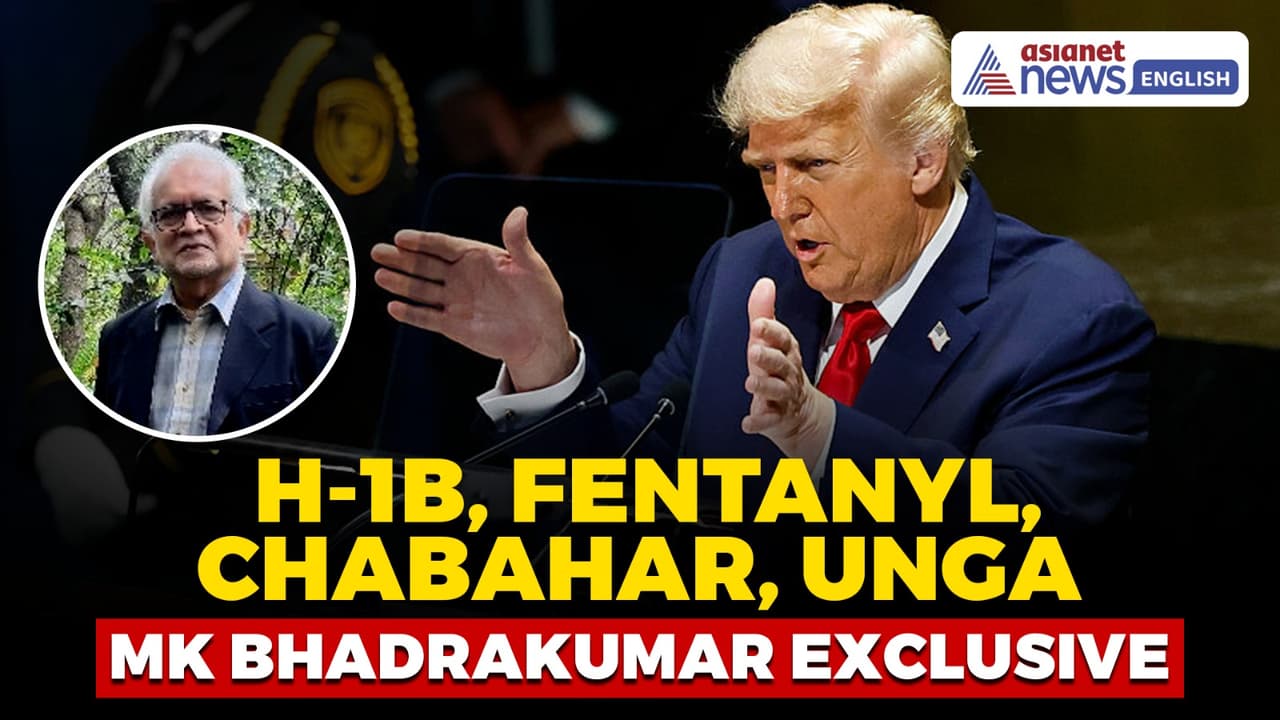In an exclusive with Asianet Newsable English, Ambassador MK Bhadrakumar decodes H-1B visa fee hike, Trump’s fentanyl charge on India, Chabahar sanctions, and UNGA speech, offering sharp insights on US strategy and India’s response.
The White House’s dramatic clarification on the new $100,000 H-1B visa fee may have temporarily calmed nerves in the tech industry, but the debate around its political intent continues. At the same time, US President Donald Trump’s fresh allegations linking India to fentanyl trafficking and his blunt United Nations General Assembly (UNGA) address have put New Delhi in the spotlight.
To make sense of these developments, Ambassador MK Bhadrakumar, a veteran Indian diplomat with over three decades of experience across Iran, Afghanistan, Pakistan, Turkey and the former Soviet Union, spoke exclusively to Asianet Newsable English’s Heena Sharma on how India should interpret and respond.
The $100,000 H-1B Visa Fee: “Not India-Centric”
Reacting to the controversy over the H-1B visa fee hike, Bhadrakumar stressed that Trump’s move must be seen through the prism of US politics rather than India-specific targeting.
“Well, I think, you know, the optics are primarily in terms of the domestic situation in the United States, the MAGA movement. You know, this is a campaign plan of Trump in the last election. And this was in the forefront, along with, you know, illegal migration and all that,” he explained.
“So, I don’t think it is an India-centric affair. I think it is, ultimately, its denominator will be in terms of, you know, the domestic politics. And within the U.S. itself, there is a split opinion on this matter,” he added.
The ambassador acknowledged the concern for India’s IT industry, employment, and remittances but stressed that Washington’s priorities are domestic first.
On Fentanyl and India’s Calm Response
Another flashpoint has been Trump’s remarks linking India to fentanyl trafficking — a crisis that has ravaged American society. India’s restrained response has raised questions about whether New Delhi should hit back more forcefully.
Bhadrakumar, however, urged a measured approach:
“My sense is that the United States is a global power. And its strategies, global strategies are always dynamic. And India is a cog in the wheel. Most countries are, including even United States’ allies in Europe, are cogs in the wheel.”
He pointed out that US reports mentioning India must be seen in context.
“We have to ask ourselves, what have we done or what are we doing to earn such a reputation? And I don’t think the State Department is a responsible entity. It must have been collecting facts and statistics from all over the world… And that is reflected in this reference to India.”
Instead of getting defensive, he argued, India should simply clarify its position.
“When they mention India, I think our prerogative, our right is to explain where India really stands. Whether this sort of a reference is warranted or not.”
Chabahar Port Waiver: A Bigger Picture
Trump’s decision to lift the waiver on Iran’s Chabahar Port, a lifeline for India’s access to Afghanistan and Central Asia, has raised alarm bells in New Delhi. But Bhadrakumar looked beyond the immediate headlines.
“You see, first of all, I must repeat what I said, that the United States does not act accidentally. And what does it gain out of removing this waiver? I get a feeling that we are losing the big picture here,” he noted.
That big picture, he suggested, involves the Saudi-Pakistan defence pact, Iran’s nuclear programme, and even Trump’s harsher rhetoric toward Russia — all potentially linked to longstanding US and Israeli ambitions around Iran.
Trump at the UNGA: Toothless Tiger or Harsh Truths?
Trump’s recent United Nations General Assembly speech touched raw nerves — from calling the UN ineffective to dismissing climate change. For Bhadrakumar, the remarks on the UN echoed long-standing critiques.
“You must first of all realize that the United Nations establishment… has also recognized that there are negative features about its working. The United Nations itself has initiated a program to cut down the size of its bureaucracy. Now, what does it show? It shows that there has been a colossal wastage of resources.”
He acknowledged that Washington’s frustration is real, given its outsized financial contributions:
“The Americans feel peeved that, you know, that they are taking a very hefty portion of that budgetary responsibility and they are not getting commensurate returns. And a leader like Trump is very conscious of the outflow of resources.”
On climate change, Bhadrakumar was blunt:
“Is there anything new in this? The man had never hidden this. He’s been very open about it. And he strongly… wants to step up oil production in the United States. And, you know, he doesn’t believe when he has poo-pooed green energy all along.”
